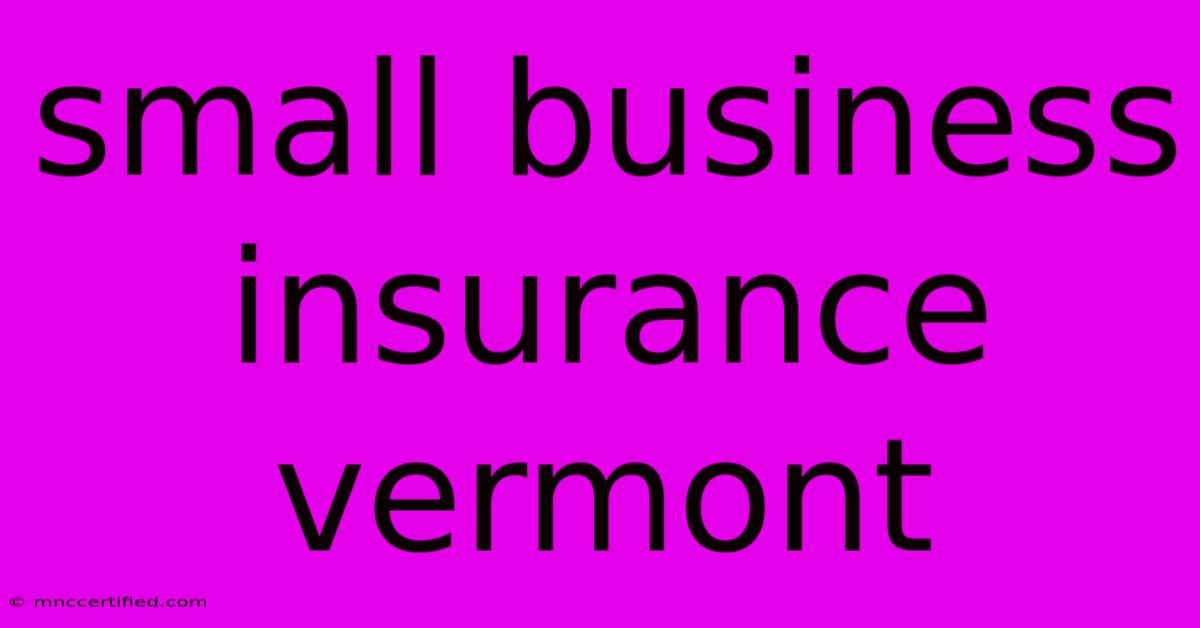Small Business Insurance Vermont

Table of Contents
Navigating Small Business Insurance in Vermont: A Comprehensive Guide
Finding the right insurance for your small business in Vermont can feel overwhelming. With so many options and varying coverage needs, it's crucial to understand your responsibilities and how to secure the best protection. This comprehensive guide will walk you through the essential types of insurance, factors influencing costs, and how to find the perfect fit for your Vermont-based business.
Understanding Your Insurance Needs in Vermont
Vermont, like any state, has specific legal requirements and industry-specific risks. Before diving into specific policies, consider these key aspects:
1. Legal Requirements:
-
Workers' Compensation Insurance: If you have employees in Vermont, workers' compensation insurance is mandatory. This covers medical expenses and lost wages for employees injured on the job. Failure to comply can result in significant penalties.
-
Unemployment Insurance: This protects employees who lose their jobs through no fault of their own. It's a crucial aspect of employing individuals in Vermont.
-
Other Potential Requirements: Depending on your industry (e.g., construction, healthcare), you might face additional licensing or insurance stipulations. Check with the Vermont Department of Labor and the relevant regulatory bodies for your specific sector.
2. Common Insurance Types for Vermont Small Businesses:
-
General Liability Insurance: This protects your business from claims of bodily injury or property damage caused by your operations or employees. It's essential for mitigating risks associated with customer interactions, accidents on your premises, and product liability.
-
Professional Liability Insurance (Errors & Omissions): If your business provides professional services (e.g., consulting, design), this coverage protects against claims of negligence or mistakes in your work.
-
Commercial Property Insurance: This covers your business property, including buildings, equipment, and inventory, against damage from fire, theft, vandalism, and other unforeseen events.
-
Commercial Auto Insurance: If you use vehicles for business purposes, this is crucial. It covers accidents, damage to your vehicles, and potential injuries to others.
-
Cyber Liability Insurance: In today's digital age, protecting your business from cyber threats is paramount. This insurance covers data breaches, cyber extortion, and other digital risks.
Factors Affecting Small Business Insurance Costs in Vermont
Several factors influence the cost of your insurance premiums in Vermont:
-
Industry: High-risk industries (e.g., construction) generally face higher premiums than lower-risk ones.
-
Location: Businesses in areas with higher crime rates or a greater likelihood of natural disasters may pay more.
-
Number of Employees: More employees typically mean higher workers' compensation costs.
-
Claims History: A history of claims can significantly increase your premiums.
-
Coverage Limits: Higher coverage limits generally lead to higher premiums, but offer greater protection.
Finding the Right Small Business Insurance in Vermont
Choosing the right insurance requires careful research and comparison. Here's how to navigate the process:
-
Assess Your Risks: Thoroughly evaluate your business operations to identify potential liabilities and areas needing coverage.
-
Compare Quotes: Obtain quotes from multiple insurance providers to compare prices and coverage options. Don't solely focus on price; consider the reputation and financial stability of the insurer.
-
Work with an Independent Agent: An independent agent can provide unbiased advice and help you find the best policies to meet your specific needs.
-
Review Policy Details: Carefully read the policy documents to understand the terms, conditions, and exclusions.
-
Regularly Review Your Coverage: Your business needs may change over time. Review your insurance coverage annually to ensure it remains adequate.
Conclusion: Protecting Your Vermont Business
Securing the appropriate small business insurance in Vermont is crucial for protecting your financial future and ensuring the longevity of your enterprise. By understanding your needs, comparing options, and working with a knowledgeable professional, you can find the right coverage to safeguard your business from unforeseen events. Remember to regularly review your policies to adapt to evolving risks and ensure your Vermont business thrives.

Thank you for visiting our website wich cover about Small Business Insurance Vermont. We hope the information provided has been useful to you. Feel free to contact us if you have any questions or need further assistance. See you next time and dont miss to bookmark.
Featured Posts
-
Freedom Of Choice Life Insurance
Nov 22, 2024
-
I M A Celebs Coles Admits Past Lie
Nov 22, 2024
-
Do You Need Boat Insurance In Pa
Nov 22, 2024
-
Cleveland State Health Insurance
Nov 22, 2024
-
What Does Alae Mean In Insurance
Nov 22, 2024